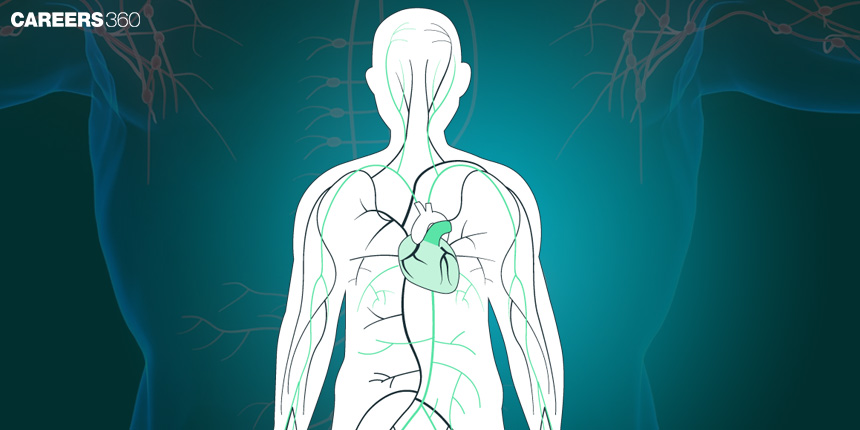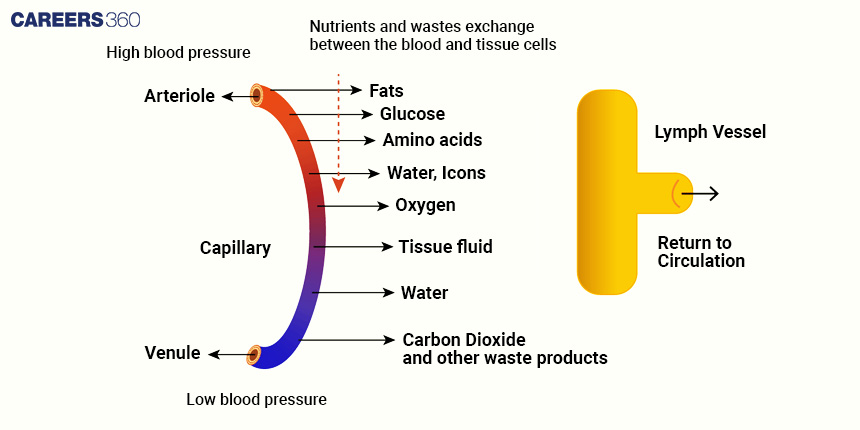Composition And Function Of Lymph In Humans
What Is Lymph?
Lymph is a clear or colourless fluid that flows through the lymphatic system. In essence, the lymphatic system acts as a filter against microbes, organic wastes, toxins, and other types of debris. It carries lymphocytes that move throughout the body fighting infections.
In animals and humans, the extracellular fluid, or the fluid outside the cell, is divided into interstitial fluid, or fluid existing between the tissues, and plasma. It contains small water-soluble substances that flow in between the tissue cells. Plasma and interstitial fluid are similar due to continuous exchange across tissue capillary walls of small solutes, water, and ions.
NEET 2025: Mock Test Series | Syllabus | High Scoring Topics | PYQs
NEET Important PYQ's Subject wise: Physics | Chemistry | Biology
New: Meet Careers360 B.Tech/NEET Experts in your City | Book your Seat now
- What Is Lymph?
- Composition Of Lymph
- Other Components of Lymph in Humans
- Formation Of Lymph
- Proteins And fats
- Function Of Lymph

It does the following functions:
The delivery of nutrients to cells.
It enables intercellular communication between cells themselves.
Interstitial fluid removes metabolic waste products from cells.
The lymphatic system collects the interstitial fluid, and the rest is drained out. The drained fluid moves back to the blood vessels, and the remaining fluid is collected through the lymph capillaries, which are part of the lymphatic capillaries.
Composition Of Lymph
Lymphatic systems are formed by lymph plasma, lymph corpuscles, and lymphoid organs. The composition of the lymph is explained as follows:
Lymph Plasma
Lymph is interstitial fluid. It has a similar mineral content to plasma. This real antibody contains less calcium than plasma, fewer blood proteins, less phosphorus, and an increased concentration of glucose. Globulin proteins are present in the lymph plasma. Other materials include organic and inorganic substances. It is through the lymph that the exchange between blood and tissue cells takes place in terms of gases and nutrients.
Lymph Corpuscles
These will include leucocytes and amoeboid cells. It contains specialized lymphocytes which take part in inducing immune responses in the human body.
Lymphoid Organs
The lymphatic system comprises many lymph nodes deep within the body. The lymph nodes are linked with lymphatic vessels that circulate the lymph throughout the body. The lymph gets filtered at the lymph nodes. The spleen, tonsils, adenoids, and thymus make up part of the lymphatic system. The spleen is regarded as the largest lymphatic organ in the system and is found under the ribcage, above the stomach, and in the left upper quadrant of the abdomen. Other constituents of the lymphatic system – tonsils, adenoids, and thymus are found on either side of the throat and neck.
Other Components of Lymph in Humans
Carbohydrates
Lymphocytes
Creatinine
Water – 94%
Urea
Chlorides
Enzymes
Proteins – Albumin, globulin and fibrinogen
Non-protein nitrogenous substances
Formation Of Lymph
Lymph is formed from interstitial fluid because the lymph vessel capillaries are permeable. When blood flows through blood capillaries in the tissues, 9/10ths of the fluid from the arterial end flows into the venous end of capillaries. The remaining one-tenth of the fluid then diffuses—in a pressure-driven process—into the very permeable lymph capillaries.
Hence, when lymph flows through lymph capillaries, its composition, including its protein content, is more or less the same as that of the interstitial fluid. Since it is bigger than blood capillaries, proteins present in the interstitial fluid cannot diffuse into blood capillaries. Thus, they enter the lymph vessels which are freely permeable to large particles.
Proteins And fats
More protein and lipid substances are present within tissue fluid from the liver and gastrointestinal tract. Hence, comparatively high amounts of proteins and lipids enter into the lymph vessels of the liver and gastrointestinal tract. As a result, lymph in larger vessels contains more amount of proteins and lipids.
Function Of Lymph
Lymph performs some functions of paramount importance. A few major functions of lymph are mentioned below:
It helps to keep the body cells moist.
It transports oxygen, hormones, and nutrients to various parts of the body.
It carries metabolic waste produced by cells.
It carries antibodies and lymphocytes to the blood vessels.
The composition of tissue fluid and volume of blood is maintained by it
Absorption of fats from the small intestine occurs through lymphatic vessels.
Invasion of microbes and foreign substances is not allowed into the lymph nodes.
Frequently Asked Questions (FAQs)
The lymphatic organs include the spleen, thymus, and tonsils.
The symptoms of a blocked lymphatic system include swelling, fatigue, bloating, depression, and excess weight gain.
The lymphatic system circulates lymph containing white blood cells that fight infections throughout the body.
The lymphatic system includes all the lymphatic vessels and lymphoid organs including the lymph nodes, thymus, spleen, and lymphatic tissues like Peyer's patches and tonsils.
Lymph nodes are small, bean-shaped organs that extend the immune system by filtering the viruses, bacteria, and other causative agents of disease that circulate through the lymphatic system.
Also Read
29 Nov'24 01:19 PM
27 Nov'24 07:39 PM
27 Nov'24 07:15 PM
27 Nov'24 05:11 PM
26 Nov'24 08:14 PM
26 Nov'24 06:50 PM
26 Nov'24 05:51 PM
26 Nov'24 04:44 PM
26 Nov'24 03:52 PM
26 Nov'24 02:55 PM
